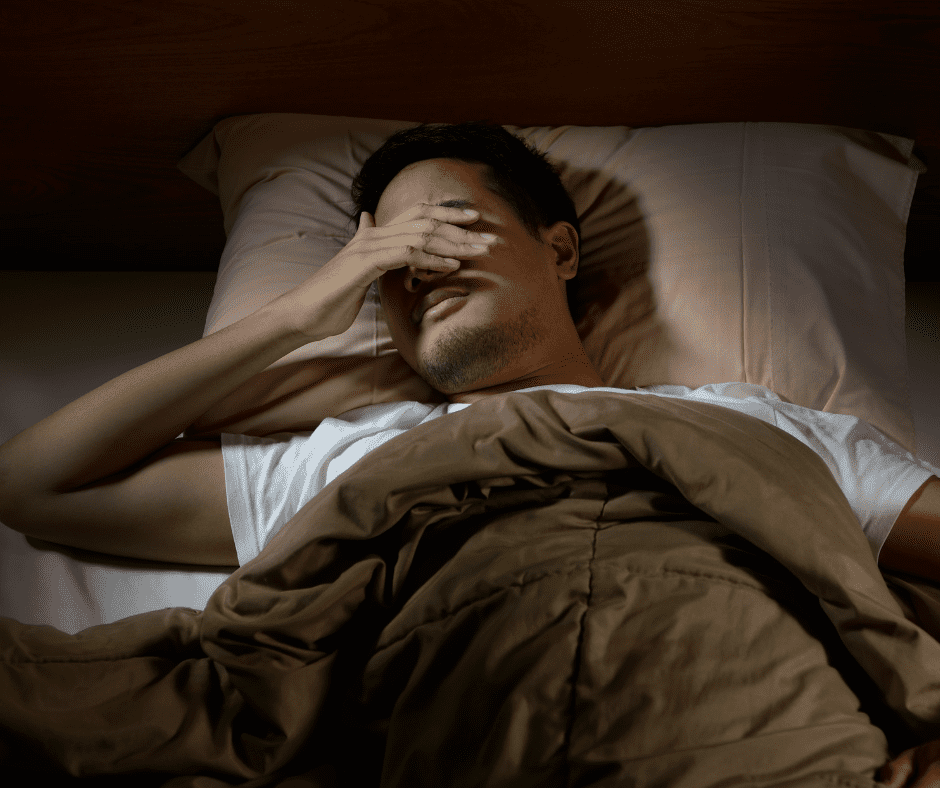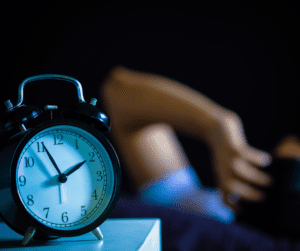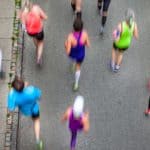It is assumed that if you’re a runner you’re easily able to get a fantastic night’s sleep…
The truth is that a lot of runners suffer from sleepless nights as a result of their training, more specifically, their long runs.
Let’s have a look at why this is the case…

Why You Have Trouble Sleeping After a Long Run
- Overreaching/Overtraining
- Incorrect Nutrients
- Time Of Training
- Nerves & Excitement
Overreaching/Overtraining
It was concluded in this study looking at if “Sleep can be used as an indicator of overreaching and overtraining in athletes” that disturbances in sleep are believed to be a key symptom of overreaching/overtraining, which may be a direct result of increased training load or indirect alterations to the training schedule.
If you increase your training load without sufficient recovery, you will eventually put yourself at risk of overreaching and eventually overtraining.
Overreaching is the bit before you are actually overtrained. Overtrained status is very severe and takes months to reverse
Where performance as well as physical health declines rapidly and will take months to reverse.
Overreaching as explained above is more in line with what most people will experience – which is characterized by (decreased max HR in sessions, fatigue, etc).
A lack of sleep means we don’t get the benefit of the release of hormones like testosterone, growth hormone, etc., and instead produce stress hormones like cortisol, which inhibits sleep. Continuing in this cycle will just get worse and worse. No sleep = less recovery = less sleep = worse recovery…
Signs Of Overreaching & Overtraining
Overreaching is temporary and caused by a sudden increase in training loads.
The symptoms of overreaching:
- Feeling unwell
- Disrupted sleep
- Mood fluctuations
- Alterations in heart rate
- Increased perceived exertion
- Continued muscle soreness
If you notice the symptoms of overreaching early on it will have a slight impact on performance, as this is generally why athletes think something is initially wrong. It’s not as dramatic as overtraining. Very often a plateau in performance
If you don’t follow the correct recovery steps and continue to train at a high intensity then it can result in overtraining.
Overtraining is when you experience extreme fatigue and it is chronic.
This condition can result in serious nervous and hormonal disorders.
When you are overreaching or overtraining your athletic performance will decrease, even though you are training at a high intensity.
Your body isn’t recovering correctly, therefore it is unable to adapt to your training.
The symptoms of overtraining can include:
- Unrestful sleep and low sleep quality
- Slow heart rate recovery after training and a higher-than-usual resting heart rate
- Increased blood pressure
- Heart palpitations
- Nervousness and emotional instability
- High Anxiety
- Inability to reach max / higher heart rate levels in training
- Inability to sustain subthreshold heart rate
- Continued muscle soreness and pains
- Decline in performance
- Poor recovery even after some time off
- Recurring injuries and illness
- Reproductive issues, such as a decrease in libido (sex drive) and a change in menstruation (including irregularity or cessation of periods).
Incorrect Nutrients
Doing long runs actually, all training without eating correctly or enough can result in you having sleepless nights. We need to fuel for all our sessions including our strength training sessions.
While training and, all the time, your body requires essential nutrients to function optimally, this is only gained through a well-balanced diet.
Well-balanced Diet: This means eating a wide variety of foods including all macro and micronutrients in the right proportions, and consuming the right amount of food and drink to achieve and maintain healthy body weight.
Remember: We know that we require sound nutrition to fuel our running, but we often forget that we need food/ fuel just to allow our body to function daily. Just for you to breathe in and out…
According to this study, nutrition can profoundly affect the hormones and inflammation status which directly or indirectly contribute to insomnia
This study points out that a diet high in refined carbohydrates can also increase the likelihood of you developing insomnia.
One of the most serious sleep disorders is obstructive sleep apnea, it actually causes you to stop breathing for periods of the time thought out the night.
Time Of Training
Experiencing insomnia could also be a sign that your body isn’t agreeing with the time of day you are training.

When you train, in a nutshell, your body produces cortisol and adrenaline… (It’s UNBELIEVABLE What Happens To Your Body On a 30min Run!)
A lot of people may not know this but the time of day that you choose to train has a major effect on the quality of sleep you will be getting that night.
The cortisol and adrenalin release could be the reason you are struggling to fall asleep or stay asleep.
If morning workouts are out of the question for you, try to train at least 3 to 4 hours before bedtime to allow your body to unwind and your mind to calm.
If you train close to bedtime then when you do hit the hay, your nervous system will still be stimulated and your heart rate could still be raised making it very hard to fall asleep.
Nerves & Excitement
If you’ve got a race planned in a few days, there’s no question about it, you’re going to be excited and for most of us, there will be some feelings of nervousness – of course, sleep is going to take a back seat when your mind is racing. (This is why sleep in the week or so leading up to race day is key and not just the night before)
What To Do When Insomnia Strikes
The night before your training or race:
Try to visualize and mentally prepare for your run, go over the route in your mind and consider anything that could go wrong. It is also a good idea to lay out your kit and fuel, that way you will sleep knowing you have prepared properly
The night after your training or race:
The adrenaline rush you get after running can last hours.
Avoid alcohol as it might help. Make sure your room is dark and cool. The darker the room, the better quality of sleep you will have. Use eye patches if you need to. Make sure that there are no flickering lights. There should be no cellphone beeping lights or TV lights. Avoid ANY blue light at least an hour before bed. Have a good run-up to your sleep time. At about 30 to 45 minutes before you plan to go to sleep, try to limit the amount of time you spend on blue lights. Instead, let your mind quieten down and opt for reading a book.
The points above are important always and are not exclusively just for the night after your training.
It’s important to note that some insomnia won’t be helped with these good sleep hygiene strategies. But these are things that are within our control to do and if they dont work then you should seek medical advice…
If you’re interested in knowing more about insomnia and running … we put together this article also outlining the effects of insomnia on your health.
Have a look at it here.



Comments are closed.